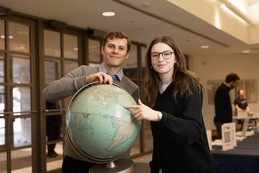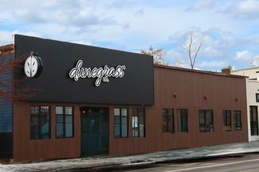
Centering Community
Crosshatch Center for Art & Ecology looks back over 17 years
By Lynda Wheatley | July 16, 2022
The mission that drove Amanda and Brad Kik to co-found the Institute of Sustainable Living, Art & Natural Design (ISLAND) in 2005—to build strong communities through the intersections of art, farming, ecology, and economy—might bring to mind that old kindergarten challenge: “One of these things is not like the other.”
Farming, ecology, and the economy intersecting, sure. But the arts? Intertwining with ecology? And farming?
Does that mean documenting history through song? Growing mushrooms for entertainment? Hosting a dance performance on a farm?
Actually, yes. And so much more.
In simple terms, ISLAND—which is now Crosshatch Center for Art & Ecology—is a Bellaire-based nonprofit that provides a multitude of resources like workshops, conferences, events, and even good old-fashioned agricultural guilds so communities around northwest Lower Michigan can become stronger, more self-reliant, and more native to place.
Amanda Kik explains the logic: “Strong communities are based on a strong culture, and culture is really built through food, agriculture, and the arts. So, our work is to focus on those people who are building the culture through food, farming, ecology, and art. And that’s going to uplift any community that it touches.”
A Helping Hand
Last month, the nonprofit got a lift of its own: The USDA and partners awarded Crosshatch $50,000 to launch a Carbon Farming Planning Cohorts program.
An on-the-ground, peer-to-peer program designed to advance climate-smart farming—think: practices that reduce emissions and sequester carbon dioxide—Crosshatch’s carbon cohort will start with a small group of farmers, maybe six to eight, says Amanda. They’ll visit and assess each other’s farms and, based on the education and best-practices they and Crosshatch share, make suggestions to improve the particular situation at each farm, such as reducing machine use or sequestering carbon through tree plantings or regenerative soil practices. At the end of the program, each farmer will have a plan tailored to their farm and receive funding to help them implement it.
The pilot carbon cohort is slated to start this fall, and Crosshatch will host another this spring. Nevertheless, they have already applied for additional funding to keep the not-yet-started program going next year.
“We just applied for a really big USDA grant,” Amanda says. “There’s a big new one that’s focused on climate-smart practices. And if we get that, then we’ll really be able to blow up [the carbon cohort] program, so—fingers crossed.”
Grassroots
No doubt luck has played a role in the longevity, reach, and impact of Crosshatch, which spearheads 13 major projects, including microloans, renewable energy grants, equipment sharing, and the Chicken Coupe, a portable, MDA-certified chicken processing trailer. But it seems more likely that the nonprofit’s success stems mostly from the Kiks’ approach to the overall endeavor: planting many small seeds of change and nurturing them with years of hard work and a big, ambitious vision for the future.
It’s been that way since the pair, newly dating after meeting Up North, dreamt up Crosshatch’s precursor, ISLAND, over martinis. Amanda, raised in suburban Detroit and just out of art school in California, wanted to start an artist residency program. Brad, a Michigan State University graduate fresh from doing conservation work in New Zealand, wanted to start a nonprofit devoted to ecology and permaculture.
“We said, well, why don’t we do all of that together? So the year we started ISLAND was the same year we got married,” she says.
They didn’t mind that their big vision met with modest means. “Our first fundraising letter went to the mailing list that we used for our wedding invitations,” Amanda adds. “And I loved that it was just family and friends—like, here’s what we’re doing, please support us.”
What they were doing was (and continues to be) a multitude. While working other full-time jobs, the couple began organizing ISLAND workshops.
They first brought to northern Michigan Dave Jacke, co-author of the groundbreaking 2005 two-volume tome Edible Forest Gardens. In 2006, partnered with other local organizations for more workshops (e.g., how to keep bees, care for goats, build a brick oven, grow shiitake mushrooms, graft fruit trees) and launched their annual Skill Swap, which brought communities together so neighbors could teach and learn hands-on skills like how to can tomatoes, identify wild herbs, repair small engines, and write songs for social liberation. And they began beta-testing their own artist residency program at the Hill House in Mancelona in 2010.
Turning Point(s)
In 2013, a major change: ISLAND received a $100,000 grant from the USDA Risk Management Agency.
“We were able to do 30 workshops that year, maybe 60—a huge expansion in programming,” Kik says. “And then we also were working with North Central Michigan College and Grow Benzie and other organizations and farmers, just expanding programming and building relationships, just humming along. It was really, really great.”
Until it wasn’t.
After receiving that grant six years in a row, eventually increasing to $200,000 and enabling first Brad, then Amanda to move from full-time volunteers to the nonprofit’s second and third employees to receive a paycheck (an intern-turned-part-timer was the first), the USDA halted the grant program to “reassess.”
The news wasn’t totally devastating. ISLAND, which had become Crosshatch in 2016, had plenty of experience operating on a shoestring. It had other sources of funding and strong relationships. “We were scrambling,” says Amanda, “but we thought we’d figure it out.”
Just as they were starting to recover, the pandemic hit.
“It was just—this is too much. This is going to be the straw that breaks us,” she says. “We’ve got kids. We’re trying to keep people employed, trying to keep ourselves employed. We were wildly stressed out and scared and everything felt so unstable. I wasn’t sure we could make it through.”
Then came a suggestion from one of the Kiks’ colleagues: “Just apply for everything you can,” Amanda recalls hearing. “And I thought, OK, that’s what I’m going to do. So that’s what we did. And it ended up stabilizing us in the end.”
New Pastures
Crosshatch not only was able to retain all three employees but also hired three more last fall. This fall, they plan to add another three.
The organization is on what Amanda calls “a growth pattern” again. Its annual Northern Michigan Small Farms Conference happened, albeit online, in 2022, and is on track for 2023. Skill Swap will return in 2023. Microloans of $500 to $10,000 for projects masterminded by local farmers and food business folks will be awarded in the coming months. And though the development of an artist residency and eco-farm on 52 acres the Kiks own in Bellaire, aka Hatchquarters, remains farther out, the near future—7pm on Aug. 3—will bring to their meadow a free performance of the TC Dance Project.
Perhaps Crosshatch’s biggest project at the moment is The Alluvion listening room, a 150-seat venue planned for Commongrounds Cooperative on Eighth Street in Traverse City. Designed by and for musicians, the performance space is intended to be “the missing middle ground” between bars (where music is often relegated to a background role and ignored) and full-size venues (where performers can lose money if they don’t fill the house).
Crosshatch co-owns the space with the cooperative and musician Jeff Haas, founder of anti-bullying program Building Bridges Through Music. One of the programs they’re envisioning is Open Stage—like an open mic night but instead of a single song, a musician or band can perform a full set, as well as record it to improve or promote themselves.
“We’re working to build a culture of support around young artists because it loops back to our mission,” says Amanda.
Trending

Michigan’s Marijuana Tax at Work
Cannabis has become a big business in northern Michigan, and local governments are putting tax dollars earned from dispensar… Read More >>
California Sober: Why People Are Switching from Alcohol to Weed
They call it “California sober.” Generally speaking, this term applies to folks who use marijuana but abstain f… Read More >>
The Legacy of Student Activism
“It’s a physical letter to your representative,” Alex Tank says when asked to define the word “prote… Read More >>


